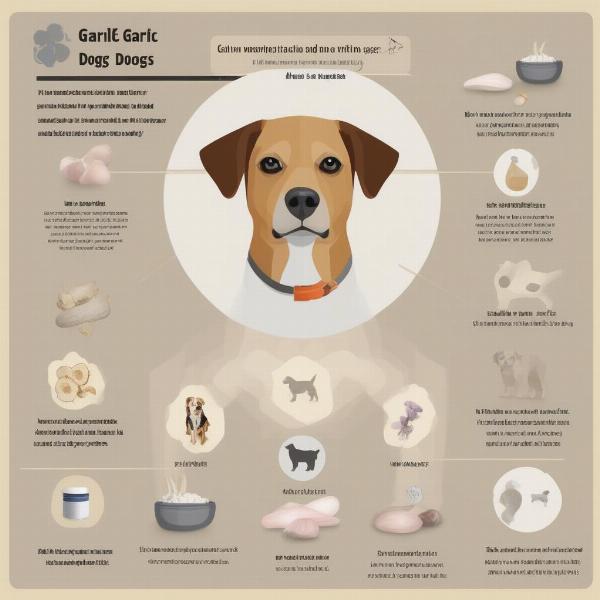Natural antibiotics for dogs have gained popularity as pet owners seek gentler ways to support their furry friends’ health. While conventional antibiotics are crucial in treating serious bacterial infections, some pet owners are interested in exploring natural options for milder cases or as supportive care alongside veterinary prescribed medications. This article will explore various natural substances with purported antibiotic properties, their potential benefits, and important safety considerations. Remember, always consult your veterinarian before giving your dog any new supplement or treatment, including natural remedies.
Understanding Natural Antibiotics for Dogs
Many natural substances possess antibacterial, antiviral, or antifungal properties. These substances, often derived from plants, have been used for centuries in traditional medicine. While some show promising results in laboratory settings, it’s crucial to remember that their effectiveness in treating infections in dogs hasn’t always been rigorously scientifically proven. They shouldn’t replace veterinary-prescribed antibiotics when a serious bacterial infection is diagnosed.
Honey: A Sweet Remedy?
Honey, a natural sweetener, is also known for its antibacterial properties. Manuka honey, in particular, has shown promising results in wound healing and fighting certain bacteria. It can be applied topically to minor cuts and scrapes.
Garlic: A Pungent Protector?
Garlic contains allicin, a compound with antibacterial and antifungal properties. While small amounts of garlic can be safe for dogs, large doses can be toxic, causing anemia. Therefore, caution is advised.
 Garlic for Dogs: Safety and Precautions
Garlic for Dogs: Safety and Precautions
Herbal Remedies for Dogs
Several herbs possess antimicrobial properties and have been used traditionally to support immune function. These include:
- Goldenseal: This herb contains berberine, an alkaloid with antibacterial and anti-inflammatory properties.
- Echinacea: Known for its immune-boosting properties, echinacea may help the body fight infections.
- Oregon Grape: Another source of berberine, Oregon grape can be used similarly to goldenseal.
Remember, while these herbs show potential, their efficacy and safety in dogs require further research. Always consult with your veterinarian before using herbal remedies on your dog.
When to Seek Veterinary Care
While natural remedies can be helpful for supporting your dog’s overall health, it’s essential to recognize when veterinary intervention is necessary. If your dog exhibits signs of a serious infection, such as lethargy, loss of appetite, fever, or vomiting, seek immediate veterinary care. Delaying appropriate treatment can have severe consequences.
Safety First: Using Natural Antibiotics for Dogs Responsibly
Natural doesn’t always mean safe. Even natural substances can have side effects and interact with other medications your dog might be taking. Always consult your veterinarian before giving your dog any new supplement or remedy, even if it’s labeled “natural.” They can assess your dog’s individual needs and determine if the remedy is appropriate. Never attempt to self-treat a serious infection. Prompt veterinary care is vital for your dog’s well-being.
Conclusion
Natural antibiotics for dogs offer a complementary approach to supporting canine health. While some natural substances show promise in fighting infections, they should not replace conventional antibiotics when dealing with serious bacterial infections. Always prioritize your dog’s safety by consulting with your veterinarian before administering any new supplements or remedies. They can guide you in making informed decisions about your dog’s health and ensure you’re providing the best possible care.
FAQ
- Can I give my dog honey for a cough? While honey can soothe a sore throat, it’s essential to consult your vet to determine the underlying cause of the cough.
- Is garlic safe for dogs? Small amounts can be safe, but large doses are toxic. Consult your vet before giving your dog garlic.
- What are the signs of a serious infection in dogs? Lethargy, loss of appetite, fever, vomiting, and diarrhea can indicate a serious infection.
- Can natural antibiotics replace prescribed antibiotics? No, natural remedies should not replace veterinary-prescribed antibiotics for serious infections.
- How can I safely use natural remedies for my dog? Always consult your vet before giving your dog any new supplement or remedy.
ILM Dog is a leading international online resource dedicated to providing dog owners worldwide with reliable and practical advice on all aspects of dog care. From breed selection and health to training, nutrition, grooming, and product recommendations, ILM Dog offers a wealth of expert-backed information to help you provide the best possible care for your furry companion. We also offer specialist advice on puppy care, senior dog care, and traveling with your dog. Contact us at [email protected] or +44 20-3965-8624 for further assistance.